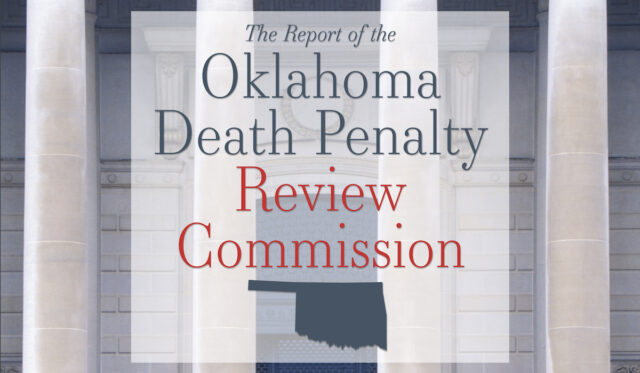
To the editors:
Your Nov. 14 article — With Oklahoma executions ramping up, some push death penalty moratorium — cites state agency leaders who, while supporting the resumption of executions, claim the Death Penalty Review Commission’s 2017 recommendations “have largely been implemented.” This claim is false.
I know because I — along with former Gov. Brad Henry and former Oklahoma Court of Criminal Appeals Judge Reta Strubhar — co-chaired the Oklahoma Death Penalty Review Commission that made these recommendations.
The five women and six men who served on the commission were politically and personally diverse. Some supported capital punishment; others opposed it.
After much debate, deliberation and a year’s worth of work, we issued a detailed report covering almost 300 pages. The report contains one general and 45 specific recommendations. The general recommendation is the centerpiece: “Commission members unanimously recommend that the current moratorium on the death penalty be extended until significant reforms have been accomplished.”
Most of the recommendations seek common sense reforms. They address serious shortcomings in every part of the death penalty process, from the initial investigation, through the trial, appeals, execution and beyond. For example:
Innocence Protection: We know — beyond any doubt — that “innocent people have been sentenced to death in Oklahoma.” That means that juries have gotten it wrong. Unsurprisingly, then, the innocence protection chapter of our report resulted in the largest number of recommendations. Four of its 10 proposed reforms involved the unreliability of eyewitness testimony. Others called for training on the limitations of eyewitness identifications, the use of double-blind procedures for lineups, recording of and training regarding best practices for police interrogations, and the use of pretrial hearings to determine whether to admit jailhouse informant testimony, much as courts do for expert witnesses.
Forensics: The commission made several recommendations, including offering forensics training for judges, following best practices with respect to certification of forensics experts, and amending Oklahoma law to require that biological evidence in capital cases “be retained until 60 days after the death of the inmate.”
Prosecutors: The commission recommended requiring that prosecutors “allow open-file discovery at all stages of a capital case.”
Defense: A defendant has a right to effective assistance of counsel. “To provide effective assistance in these high-stakes cases, counsel must be adequately compensated and funded.” Yet, the Oklahoma Indigent Defense System — OIDS — is chronically underfunded. The commission called for increased funding for training, counsel, investigators, support staff, conflict counsel, appellate counsel and the like.
As these four areas exemplify, virtually none of the commission’s more than 40 proposed reforms have been implemented. Yet, despite the numerous, serious flaws in Oklahoma’s implementation of the death penalty, the moratorium was lifted and our state has barreled ahead with an unprecedented number of executions.
Whether you support capital punishment or oppose it, one thing is clear. Oklahoma’s system is so fundamentally flawed that we cannot know that someone who has been condemned to death actually deserves the ultimate penalty.
Unjust convictions are bad. But an unjust execution would be intolerable. We can and must do better.
The reforms the Oklahoma Death Penalty Review Commission recommended are a blueprint for a better, just system. Until significant reforms are implemented, Oklahoma should put a moratorium on all executions.
Andy Lester
Edmond, Oklahoma
(Editor’s note: NonDoc runs Letters to the Editors of approximately 300 to 500 words. NonDoc reserves the right to edit lightly for length, style and grammar. We value a diverse set of voices respectfully discussing issues from different perspectives. To submit a letter for publication, please write to letters@nondoc.com.)





















